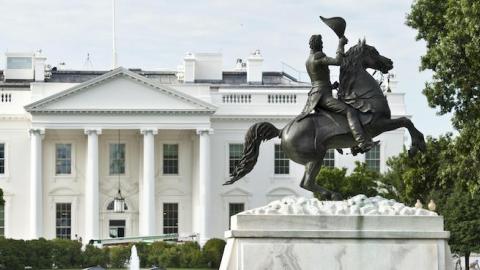The election of Donald Trump was a surprise and an upset, but the movement that he rode to the presidency has deep roots in American history. Mr. Trump’s strongest supporters are the 21st-century heirs of a political tendency that coalesced in the early 1820s around Andrew Jackson.
Old Hickory has been the despair of well-bred and well-educated Americans ever since he defeated the supremely gifted John Quincy Adams in the 1828 presidential election. Jackson’s brand of populism—nationalist, egalitarian, individualistic—remains one of the most powerful forces in American politics. The Republican Party’s extraordinary dominance in this election demonstrates just how costly the Democrats’ scornful rejection of “hillbilly populism” has been.
Jacksonian culture can be traced to the 18th-century migration of Scots-Irish settlers to the colonial backwoods and hill country. Some Jacksonians have long been Democrats; some have long been Republicans. They are not a well-organized political force, and their influence on American politics, while profound, is often diffuse.
The folk ideology of Jacksonian America does not line up well with either liberal or conservative dogma. Jacksonians have never been deficit hawks when it comes to government spending on the middle class. In the 19th century, they enthusiastically supported populist land policies culminating in the Homestead Act, which gave out western farm land for free. Today, Jacksonians support middle-class entitlements such as Social Security and Medicare, even as they remain suspicious of policies and benefits seen as supporting the poor. They do not, on the whole, approve of free trade.
Jacksonians are often libertarian when it comes to everyday life. While many of them support tough drug laws, some are recreational drug users. Jacksonian farmers participated in the Whiskey Rebellion against federal excise taxes on alcohol in the 18th century, and Jacksonians today still view tax collectors and federal agents with skepticism and hostility. One issue that largely unites Jacksonian opinion is gun control. Jacksonians often view the Second Amendment as the foundation of American liberty, ensuring the rights of a free people against overreaching government.
On race, Jacksonians have been slow to accept change. Their conception of America’s folk community has not historically included African-Americans. While a small fringe of violent racists and “white nationalists” seeks to revive old Jacksonian racist attitudes, Jacksonian America today is much more open to nonwhite and non-Anglo cultures.
Now their bitterness is directed primarily against illegal immigration and Islam, which they see as culturally and politically incompatible with their conception of American values. Jacksonians have come a long way from Jim Crow, but they still resent their tax money being spent to help the urban poor, and they overwhelming support both the death penalty and tough police tactics against violent criminals.
As for foreign policy, Jacksonians are motivated by threats. When other countries are not threatening the U.S., Jacksonians prefer a course of “live and let live.” They believe in honoring alliance commitments but are not looking for opportunities for military interventions overseas and do not favor grandiose plans for nation-building and global transformation.
In war, the fiery patriotism of Jacksonians has been America’s secret weapon. After Pearl Harbor, Jacksonian America roused to fight the Nazis and Japan. After 9/11, Jacksonians were eager to do the same in the Middle East, particularly after they were told that Saddam Hussein had weapons of mass destruction. When Iraq turned out not to be such a threat, Jacksonians felt betrayed.
Many of them voted for President Barack Obama in 2008 out of disillusion with the neoconservative agenda of war and democracy activism. Mr. Trump’s criticisms of the Iraq war and President George W. Bush struck a chord in Jacksonian America.
When war does come, Jacksonians believe in victory at any and all costs. Jacksonian opinion has never regretted the atomic attacks against Hiroshima and Nagasaki. In a war of self-defense, Jacksonian opinion recognizes no limits on the proper use of force by the U.S.
Social scientists and urban intellectuals have been predicting the death of Jacksonian America since the turn of the 20th century. Urbanization and immigration were the forces that observers like Woodrow Wilson and Walter Lippmann hoped would transform American popular culture into something less antagonistic to the rule of technocratic intellectuals ensconced in a powerful federal bureaucracy. This did not work out as planned.
It is too simple to say that economic discontent was responsible for the political insurrection that over the past year has upended the Bush and Clinton dynasties as well as the Republican establishment and Democratic electoral hopes. When liberal politicians talk eagerly about a future where whites will no longer be the majority in the U.S., Jacksonians hear a declaration of war, a plan to deprive them of power in their own country. Democratic support for identity politics among every group in the country except for heterosexual white males has strengthened a sense among Jacksonians, both male and female, that their values and their identity are under determined attack.
How President-elect Trump will channel Jacksonian frustrations into policies remains unclear. Whatever happens, though, Mr. Trump’s election sends a signal that leaders and citizens at home and abroad cannot ignore: Andrew Jackson is still the most important figure in American politics, and any political party that pours contempt on Jacksonian values risks a shocking rebuke at the hands of the voters.


















